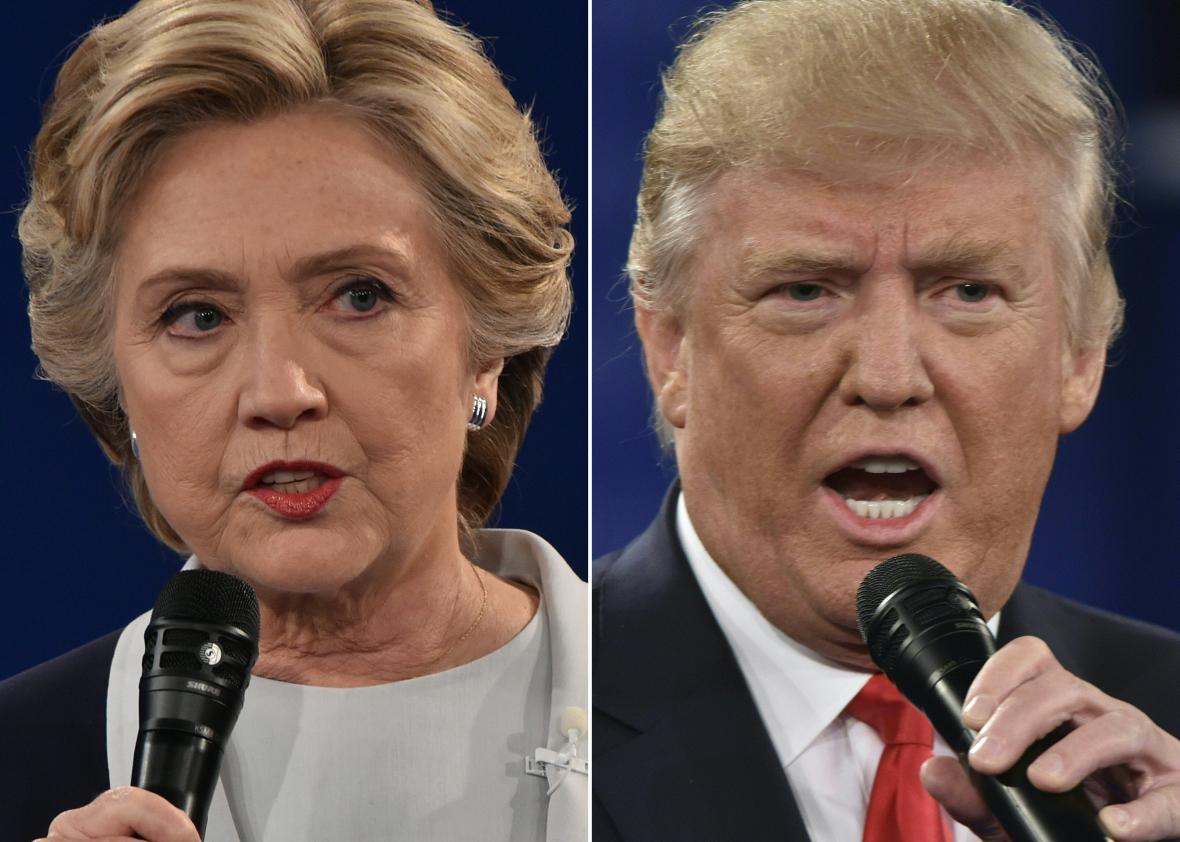On Wednesday, Time magazine named the Radioactive Space Monster—excuse me, Donald J. Trump—its Person of the Year. This is not really an outrage: The magazine’s editors aim to select an individual who “embodied what was important about the year, for better or for worse.” In past years, this person has been Adolf Hitler (in 1938) and Joseph Stalin (in 1939 and 1942). Trump isn’t exactly being honored by Time (although you can bet he’ll try to spin it that way), and you can’t argue that Trump doesn’t personify everything that is terrible and frightening about 2016.
Here’s what is an outrage, or at least a profound mystery. In Time’s assessment of Hillary Clinton—one of five runner-ups for the title—political journalist Charlotte Alter writes, “A female candidate in an election that didn’t hinge on gender after all, she became a symbol in a fight that was about much more than symbolism.” Didn’t hinge on gender after all? “[T]he race between the first plausible female presidential candidate and a man who bragged about grabbing women ‘by the pussy’ did not boil down to gender,” Alter says a few sentences later. Did not boil down to gender? Later, Alter reiterates that “the 2016 election wasn’t ultimately about gender.” Wasn’t ultimately about gender? I want to live in the universe Alter lives in.
Alter’s argument requires a definition of “about gender” that is so narrow as to be almost meaningless:
In interviews across the country in the year leading up to the election, many voters suggested that shattering the glass ceiling wasn’t an urgent priority for them. Some took it as a given that a woman will be President one day, and it wasn’t worth electing someone they believed was the wrong woman just to show it could be done.
The essay goes on to quote Republican women who “are fatigued at having to explain why, despite their shared anatomy, they never supported her and never would.” According to Alter, every argument for women to choose Clinton over Trump boiled down to “shared anatomy,” and the fact that voters did not vote for a woman because she was a woman means that gender did not play a role in her loss.
OK. Where to start with this baffling notion? Maybe with the fact that Trump’s pussy-grabbing comments—which did not deter a majority of white women from voting for him—were also pretty much by definition about gender? Trump wasn’t bragging about assaulting people regardless of their gender—which likely would have been a campaign-tanking move—he was bragging about assaulting women, which many voters were happy to wave away as locker-room talk or boys being boys. The fact that many of these Trump supporters were themselves women does not magically make their willingness to overlook his treatment of women less sexist.
Then there’s the fact that voters believed Clinton “was the wrong woman” for the job. Clinton, a woman who had served as a two-term senator from the fourth most populous state in the country and as the Secretary of State, making her one of the most qualified candidates ever to run for president—but who couldn’t escape criticism based on her supposed physical weakness and on her supposed inability to keep her husband satisfied. Might not those two lines of attack from the Trump campaign have something to do with gender? Might not the fact that voters rejected her in spite of her qualifications also have something to do with gendered double-standards?
Those are just two examples from Alter’s sentences about the ostensibly non-gendered nature of the campaign. Once you get beyond those sentences, wow are there a lot of examples of gender playing a role in the campaign! There were the “Trump That Bitch” and “Hillary Sucks but Not Like Monica” t-shirts and bumper stickers. There was the fact that Trump ceded the microphone to his daughter every time family leave came up, as though taking care of children were an issue for women alone. There were Trump’s inability to take any criticism from a woman, the subtly sexist interviews, the double standards for debate performances. Honestly, once you take away anything gender-related from the 2016 campaign, all you have left is, well, a whole bunch of racism.
The sexism that Clinton’s loss reflected is nowhere near the saddest aspect of the 2016 election. The damage that Trump is threatening to do to Muslims, Hispanic immigrants, and poor people who need healthcare, among other targets, far overshadows the symbolism of his win over an eminently qualified, centrist female candidate. But make no mistake: that win was about gender. It was about voters’ attachment to white supremacy, but it was also about their attachment to patriarchy. And anyone who wants to write about Hillary Clinton in 2016 should probably dig a little deeper than just taking voters at their word that their dislike of Clinton and embrace of Trump had absolutely nothing to do with gender.
